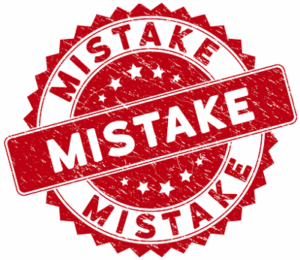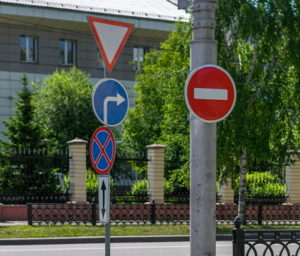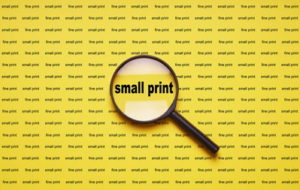 The dictionary definition of the word palpable’ is that it’s something is ‘able to be touched or felt’. Another way of referring to a palpable error, therefore, is to call it an ‘obvious error’, which helps explain it a little clearer. In essence, it is when a bookmaker offers odds on something that is a clear mistake and therefore wish to cancel all bets on it.
The dictionary definition of the word palpable’ is that it’s something is ‘able to be touched or felt’. Another way of referring to a palpable error, therefore, is to call it an ‘obvious error’, which helps explain it a little clearer. In essence, it is when a bookmaker offers odds on something that is a clear mistake and therefore wish to cancel all bets on it.
Let’s say that everyone knows that a horse is a favourite for the rate, with most bookmakers offering odds of 7/2. One bookie, however, has got their odds wrong and offered 72/1, so everyone is jumping on the bet. This would be an obvious mistake, or ‘palpable error’, so they’ll have the right to void any bets placed on those odds.
If your bookmaker has voided a bet due and cited a palpable error it should be an obvious mistake. If you believe they are using the palpable error term as an exuse though you can still make a complaint to them or escalate to IBAS.
What Makes An ‘Obvious Mistake’?
 The simple truth about palpable errors is that they’re something of a grey area in the world of betting. It’s not uncommon for punters to cry foul when a bookmaker has scrubbed their wager as a ‘palp’ when it seemed entirely fair to the bettor. Imagine that the majority of bookmakers have priced a horse at 20/1 for example, but one has opted for 200/1; that’s definitely an error.
The simple truth about palpable errors is that they’re something of a grey area in the world of betting. It’s not uncommon for punters to cry foul when a bookmaker has scrubbed their wager as a ‘palp’ when it seemed entirely fair to the bettor. Imagine that the majority of bookmakers have priced a horse at 20/1 for example, but one has opted for 200/1; that’s definitely an error.
What about if most bookies have selected odds of 20/1 for a horse and one has offered 30/1? Is that a palpable error, or is it just bad pricing on the account of the standout bookmaker? That’s where the great area comes in and it is a much-debated topic for many bettors. Many feel that it needs to be really clearly a mistake in order for bets to be scrubbed.
In short, if you have a feeling when placing the bet that you’ve got extremely lucky in placing it then the likelihood is that it’s going to be declared to be a palpable error. You’ll have a feeling that something’s not quite right and that feeling will prove to be correct more often than not. Of course, this ins’t the way it’s decided as bookies are responsible for deciding what is a ‘palp’.
There are occasions when it really is a clear mistakes. It’s not the most uncommon of things for a bookmaker to get the odds of two teams or players the wrong way around, for example, so they odds of different companies look like this:
- 5/1 – 1/2
- 5/1 – 1/2
- 5/1 – 1/2
- 5/1 – 1/2
- 1/2 – 5/1
Again, you’ll know as soon as you see them that those odds aren’t right and it will be totally fair for the bookmaker in question to void all bets taken at the 5/1 odds. If the over-round doesn’t make sense then that’s another reason you’ll know that a parable error has been made and bets placed will all be declared void eventually.
What Can You Do About It?
 The interesting question when it comes to palpable errors is what, if anything, you can do about it if you’re the victim of one. The short answer is ‘nothing’. The obvious body to turn to for help would be the Independent Betting Adjudication Service, but they will almost always side with the bookmaker. Even before turning to them you have to exhaust all options with the bookie, too.
The interesting question when it comes to palpable errors is what, if anything, you can do about it if you’re the victim of one. The short answer is ‘nothing’. The obvious body to turn to for help would be the Independent Betting Adjudication Service, but they will almost always side with the bookmaker. Even before turning to them you have to exhaust all options with the bookie, too.
Sometimes it will be the case that an error of judgement has been made by a bookmaker rather than an error in inputting data. This is when IBAS should theoretically side with the punter. They say, “Panellists will consider whether the error would have been discernible to a customer with a reasonable knowledge of betting and the sport in question.”
What this means is that if they think that a reasonable person will have known that it was an error then they’re going to declare it to be so. It is something that often leads bettors feeling aggrieved, though, because they think that bookies should be held to the same standard as normal high street shops, who can’t ask for more money once an item has been sold.
To put it another way, imagine going into an electrical shop and the price on a computer is £100 instead of £1,000. If you take it up to the till and they say that there’s been a mistake before processing your purchase then that’s fair enough. If they sell it to your for £100, however, they can’t later charge you another £900 when they realise their mistake.
Many punters feel that this is what bookmakers do. You place your bet at odds of 20/1 instead of 2/1, the bet wins and the bookmaker then refuses to pay you your winnings because they made an error. It’s fine if they acknowledge that error before the event takes place, but is it ok for them back out of the wager after the event has taken place? That’s the really tricky bit.
Bookies Handle Palpable Errors Differently
 Different bookmakers will handle palpable errors differently from each other and you can tell a lot about a company from the approach that they take. Lesser-known bookmakers when faced with a mistake will almost certainty just void all bets and walk away from the situation feeling as though they’ve done nothing wrong.
Different bookmakers will handle palpable errors differently from each other and you can tell a lot about a company from the approach that they take. Lesser-known bookmakers when faced with a mistake will almost certainty just void all bets and walk away from the situation feeling as though they’ve done nothing wrong.
Other bookies, meanwhile, will take a different approach. It’s not unheard of for some of the bigger bookmakers to pay out on palpable errors at what the odds should have been rather than just scrapping them altogether. When faced with the two different approaches, most punters will prefer the latter to the former and will bet with those bookies again.
There was a famous example involving FanDuel in America. At the Meadowlands Racetrack in New Jersey a customer placed a live bet on the Broncos to defeat the Raiders at odds of 750/1. The actually odds were 1/6 and the mistaken odds were only available for seconds, but this punter managed to get in there and place a $112 bet at the inflated price.
When the Broncos did indeed win the game the customer expected to be paid out but was initially refused. He kicked up a bit of a fuss, even though FanDual had clear palp rules in their terms and conditions. Eventually the company decided to reverse their decision, paying out the $85,000 because they felt it was good PR. Don’t expect that to happen very often!
What If You’ve Already Been Paid Out?
 Palpable errors are generally picked up quickly before a market goes live and you bets are voided in advance. On rare occasions though bets can sometimes settle, especially if that error in for an in-play market. In this scenario you may be paid out before the betting site picks up on the error.
Palpable errors are generally picked up quickly before a market goes live and you bets are voided in advance. On rare occasions though bets can sometimes settle, especially if that error in for an in-play market. In this scenario you may be paid out before the betting site picks up on the error.
In this situation if the money is still in your account they will simply take it back but if you have already withdrawn it then they will likely ask for it back. You may think you are within your rights to keep it, however you would need to do things properly, e.g going through IBAS. If you simply keep the money and ignore them then they are within thier rights to pursue you legally as it is in their terms and conditions that you have agreed to. They probably wouldn’t do this if it was a low amount but likely would if it was significant.
